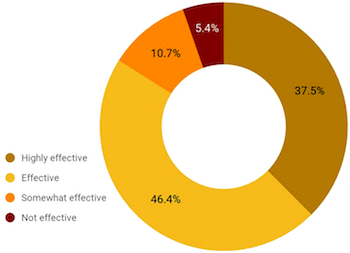Influencer engagement programs have become a mainstay for online marketing campaigns, and a recent report conducted by influencer marketing platform SocialPubli.com shows how much this booming practice might continue to grow in the years to come.
The report, which surveyed marketing pros about their challenges and successes with influencer marketing and where they see the industry heading, found that virtually all marketers (93 percent) currently use influencer marketing in some capacity, with 72 percent reporting using influencer marketing for more than a year and 28 percent claiming they’ve used it for more than three years.

Is influencer marketing effective? |
An overwhelming majority of marketers (84 percent) also said they find the practice effective, and most (60 percent) said they plan to increase their influencer marketing budget this year, while 30 percent said they expect to maintain the same budget.
More than half of marketers polled (53 percent) said they currently allocate at least 10 percent of their budgets to influencer marketing. Three percent dedicate between 25 and 50 percent of their budgets and 18 percent dedicate more than 50 percent.
Only about three percent reported plans to decrease their influencer marketing spending in 2019.
A majority of marketers polled (35 percent) said they utilize influencers for content promotion purposes, followed by product launch support (34 percent) and brand events (20 percent). Only five percent said they collaborate with influencers for corporate announcements or use them for crisis management purposes.
Among the benefits for collaborating with influencers, an ability to reach target audiences and building trust and credibility among consumers were cited most often by marketers. Marketers listed their main objectives for utilizing an influencer campaign as increasing brand awareness (26 percent), driving brand engagement (17 percent) and reaching new audiences (13 percent).
By far, Instagram remains the most popular platform for influencer marketing, with more than two-thirds (67 percent) of marketers naming the photo-sharing site as their favorite social network. Facebook came in at a distant second (12.5 percent) followed by Twitter (six percent).
A majority (37 percent) of marketers said they leverage influencer marketing only for special occasions, but nearly as many (30 percent) said they utilize an “always on” influencer strategy and 26 percent said they use it periodically.
Engagement was cited by a majority of marketers (29 percent) as the top reason for choosing an influencer, followed by content quality (23 percent), reach (21 percent), audience size (14 percent) and cost (12 percent).
More than half (54 percent) said they prefer to outsource management of their influencer marketing campaigns, while 46 percent said they manage their influencer marketing in-house. An overwhelming majority of marketers polled (87 percent) said they preferred influencers to post original content.
Nearly a third (28 percent) of respondents said measuring ROI was their biggest challenge for influencer campaigns, followed by verifying influencers’ authenticity as well as their followers (21 percent) and finding the most relevant influencers (16 percent). When asked how they measure the success of their influencer campaigns, a majority of marketers placed an emphasis on engagement (26 percent), followed by reach (19 percent), web traffic increases (13 percent) and sales and lead generation (13 percent).
The study found that most marketers believe some combination of influencer marketing, SEO and social media ads constitute the best strategy for boosting brand visibility and engagement, with influencer marketing cited as the top choice (35 percent), followed by SEO (29 percent) and social ads (22 percent).
SocialPubli.com’s “2019 Influencer Marketing Report: A Marketer’s Perspective” surveyed 150 marketing, communication, and PR professionals working in multiple industry sectors in the United States, Spain, Portugal, Colombia, Mexico and Peru in December.


 Abandon traditional content plans focused on a linear buyer progression and instead embrace a consumer journey where no matter which direction they travel, they get what they need, stressed marketing pro Ashley Faus during O'Dwyer's webinar Apr. 2.
Abandon traditional content plans focused on a linear buyer progression and instead embrace a consumer journey where no matter which direction they travel, they get what they need, stressed marketing pro Ashley Faus during O'Dwyer's webinar Apr. 2. Freelance marketers and the companies that hire them are both satisfied with the current work arrangements they have and anticipate the volume of freelance opportunities to increase in the future, according to new data on the growing freelance marketing economy.
Freelance marketers and the companies that hire them are both satisfied with the current work arrangements they have and anticipate the volume of freelance opportunities to increase in the future, according to new data on the growing freelance marketing economy. Home Depot's new attempt to occupy two market positions at once will require careful positioning strategy and execution to make it work.
Home Depot's new attempt to occupy two market positions at once will require careful positioning strategy and execution to make it work. Verizon snags Peloton Interactive chief marketing officer Leslie Berland as its new CMO, effective Jan. 9. Berland succeeds Diego Scotti, who left Verizon earlier this year.
Verizon snags Peloton Interactive chief marketing officer Leslie Berland as its new CMO, effective Jan. 9. Berland succeeds Diego Scotti, who left Verizon earlier this year.  Norm de Greve, who has been CMO at CVS Health since 2015, is taking the top marketing job at General Motors, effective July 31.
Norm de Greve, who has been CMO at CVS Health since 2015, is taking the top marketing job at General Motors, effective July 31.


 Have a comment? Send it to
Have a comment? Send it to 
No comments have been submitted for this story yet.